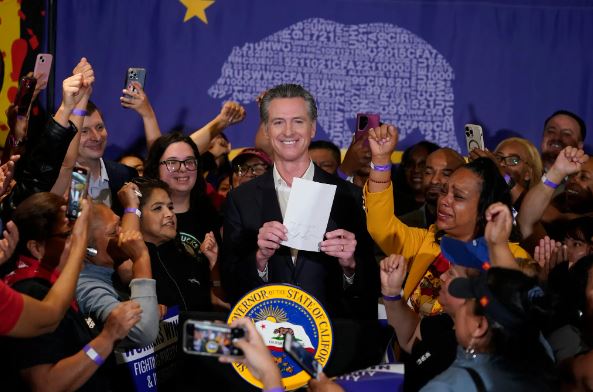California Governor Gavin Newsom, a prominent figure on the national stage, found himself embroiled in a local controversy this week as allegations of favoritism surfaced regarding a campaign donor in Sacramento. The issue centers on a provision in a new minimum wage law that seemingly benefits a major campaign contributor who owns multiple Panera Bread franchises. While Newsom’s office vehemently denied any impropriety, the unfolding situation has sparked a flurry of reactions, including calls for investigation from Republican leaders in the State Legislature and scrutiny from editorial boards. Some political analysts have drawn comparisons to a previous incident involving Newsom and a high-profile restaurant dinner during the pandemic. Despite efforts to address the concerns swiftly, the episode underscores ongoing questions about political influence in policy decisions.
At the heart of the controversy is legislation signed by Governor Newsom last September, which aims to raise the minimum wage for over half a million fast-food workers to $20 per hour, starting next month. The bill, the result of extensive negotiations between labor groups and fast-food corporations, included provisions that granted concessions to both sides. Notably, it raised the minimum wage for fast-food workers while also exempting certain establishments, specifically those with on-site bakeries selling bread as a menu item, from the wage increase.
Questions surrounding this exemption intensified following a report by Bloomberg, which revealed the involvement of a campaign donor, Greg Flynn, in advocating for the carve-out. Flynn, a billionaire with ties to Newsom and a history of campaign contributions to the governor, owns numerous Panera Bread franchises in California. While Newsom’s office has vehemently denied any undue influence, pointing out that Flynn’s company’s operations may not meet the criteria for the exemption, critics have raised concerns about potential favoritism.
Republican leaders in the State Legislature wasted no time in calling for an investigation into the matter, framing it as the latest example of political favoritism by Newsom. While the governor’s response to this controversy has been swifter than in previous incidents, including the infamous French Laundry dinner, questions remain about the drafting of the legislation and the nature of Newsom’s relationship with Flynn.
Critics argue that the appearance of impropriety undermines public trust in government and raises concerns about the influence of campaign donors on policymaking. Despite assertions from Newsom’s office and other involved parties that the exemption was not intended to benefit any specific company, the episode has reignited debates about transparency and accountability in politics.
In response to mounting scrutiny, Newsom’s office reiterated that the governor had never personally met with Flynn regarding the legislation and dismissed the allegations of favoritism as baseless. Additionally, labor unions involved in negotiating the law emphasized that the exemption was meant to provide clarity on what constitutes a fast-food establishment rather than to benefit individual companies.
While Flynn acknowledged opposing the initial fast-food legislation, he denied seeking special treatment for his businesses and expressed surprise at the specific bakery exemption. However, the controversy has prompted renewed calls for transparency in the legislative process and heightened awareness of the potential influence of campaign contributions on public policy.
As the situation continues to unfold, stakeholders on all sides are closely monitoring developments and assessing the implications for governance and accountability in California. Despite the governor’s efforts to address the concerns swiftly, the controversy surrounding the minimum wage law exemption underscores broader challenges related to political influence and the integrity of policymaking processes.

